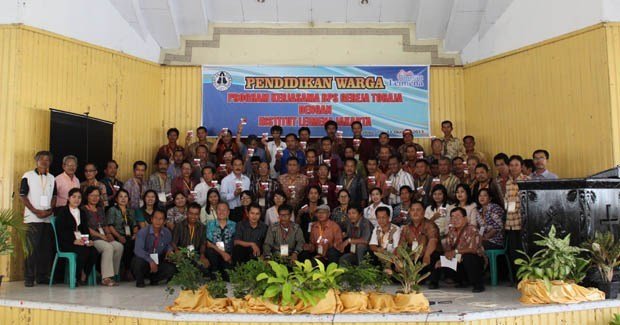
Civis 004/2015
Introduction
Since the beginning, the church and Christians in Indonesia placed themselves as a part of the society, despite of them coming with a background from the Western missionaries in the past century. From the start, Indonesian Christians have been actively involving themselves in the national development movement, in the effort to fight, enforce, and preserve the nation’s independence. It also happens in the reformation era. In the period of physical struggle in defending independence, i.e. in war, it is a common thing for Christians in Indonesia to fight alongside their brothers facing the Dutch colonial government who wanted to gain back their dominance over the Dutch Indies. In all aspects of developments, Indonesian Christians also held an important role. Active involvement is not only found in the grass root level, but also in the nation leadership, alongside their nation comrades.
In general, churches understood their calling to guide God’s people as a part of the nation, to take part, and together with other compatriots from various backgrounds of faith and belief in building the nation and the state. With all its limitations, the Indonesian church has encouraged Indonesian Christians to build themselves as a part of the whole nation and society, keeping away exclusive behaviour.
That is a very important starting attitude, because Indonesian Christians are not guests and not castaways either (comparing with the context in Jeremiah 29:7), but is sent to bring light and goodness for all, not to busy themselves with their own lives (comparing with Isaiah 49:6).
But, sometimes there are temptations, like what several of the disciples experienced going face to face with Jesus, who understood the calling as a duty to free the Jews from “Rome colonialism” and to rebuild a special kingdom for “Jews” (compare with Luke 24:21 and Acts 1:6); sees that as a calling for a political messiah.
Thus, over the history, Indonesian Christians have developed positive-participatory and contructive attitude, being in the middle, together and being an inseparable part of this nation, together overcoming many obstacles and fighting to build a brighter future, what Indonesians dream of, as is written in the Preamble of The 1945 Constitution1.
The fourth paragraph of the The 1945 Constitution Preamble compactly summarizes the heart and dreams of the Indonesian national struggle by saying:
“Pursuant to which, in order to form a Government of the State of Indonesia that shall protect the whole people of Indonesia and the entire homeland of Indonesia, and in order to advance general prosperity, to develop the nation’s intellectual life, and to contribute to the implementation of a world order based on freedom, lasting peace and social justice, Indonesia’s National Independence shall be laid down in a Constitution of the State of Indonesia, which is to be established as the State of the Republic of Indonesia with sovereignty of the people and based on the belief in the One and Only God, on just and civilized humanity, on the unity of Indonesia and on democratic rule that is guided by the strength of wisdom resulting from deliberation / representation, so as to realize social justice for all the people of Indonesia.”
(Continued in Indonesian Nationhood)
1History noted that this is the only part of the 1945 Constitution that was made independently, far from the supervision, influence and pressure from the Japanese colonial. This Jakarta Charter draft was done by the Nine Committe (Panitia Sembilan) consisting of Soekarno, Mohammad Hatta, Mohammad Yamin, Soebardjo, Maramis, Kahar Moezakir, Wahid Hasjim, Abikoesno and Agoes Salim. The draft was approved by Team 38 BPUPK but was rejected by the BPUPK plenary and was replaced by the draft made by Soebarjo, Soepomo, Soekiman and Parada.
(This Paper was presented in the Church and Politics Strategic Forum held by Leimena Institute in Jakarta on February 9-12, 2015)

Drs. Jakob Tobing, MPA
President, Leimena Institute
Jakob Tobing is one of the most prominent architects of the new democratic Indonesia. He played an instrumental role in Indonesia’s transition from the authoritarian rule to democracy in 1998. He was then entrusted as the Chairman of the 1999 National Election Committee and the 1999-2004 Parliamentary Commission on the Constitutional Amendment – the two important bodies that decisively replaced authoritarianism with democracy in Indonesia. Under his leadership, the constitutional amendment has guaranteed the principles of democracy, rule of law, and human rights, which is now seen as a model by many other countries. He was a student leader against the old order in 1966, appointed as member of parliament in 1968, and became the Vice Chairman of the ruling party during the Suharto’s regime. But during the height of the authoritarian regime, he joined the opposition and was invited to join and establish the reform PDIP party by its Chairman Megawati Soekarnoputri, who later became the President of Indonesia. President Habibie decorated him with Mahaputera Utama medal in 1999. After more than three decades as a member of parliament, in 2004 he was appointed as the Indonesian Ambassador to the Republic of Korea, a leadership role which again he performed so outstanding that the Republic of Korea awarded him the Gwanghwa medal—the country’s highest diplomatic award. He received his graduate degree from the John F. Kennedy School of Government, Harvard University, USA.
